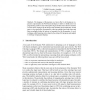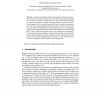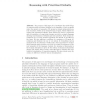404 search results - page 52 / 81 » Extending Fuzzy Description Logics for the Semantic Web |
RULEML
2005
Springer
14 years 1 months ago
2005
Springer
Abstract. The language of dl-programs is a latest effort in developing an expressive representation for Web-based ontologies. It allows to build answer set programming (ASP) on top...
PPSWR
2005
Springer
14 years 1 months ago
2005
Springer
The Semantic Web is an endeavour aiming at enhancing Web data with meta-data and data processing, as well as processing methods specifying the “meaning” of such data and allowi...
SEMWEB
2004
Springer
14 years 27 days ago
2004
Springer
We argue that in a distributed context, such as the Semantic Web, ontology engineers and data creators often cannot control (or even imagine) the possible uses their data or ontolo...
RSCTC
2000
Springer
13 years 11 months ago
2000
Springer
Abstract. In spatial reasoning the qualitative description of relations between spatial regions is of practical importance and has been widely studied. Examples of such relations a...
LPKR
1997
Springer
13 years 11 months ago
1997
Springer
The purpose of this paper is to investigate the methodology of reasoning with prioritized defaults in the language of logic programs under the answer set semantics. We present a do...



